STEM has become a trendy buzzword in the education world in recent years, but Tennessee’s 4-H Electric Camp was sparking excitement in STEM subject areas long before it was cool. A fun and educational tradition among 4-H members since it began in 1992, 4-H Electric Camp happens every June on the University of Tennessee campus in Knoxville.
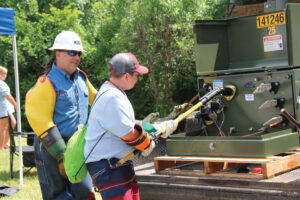
“The overall goal of the 4-H Electric Camp is to improve young 4-H members’ knowledge and excitement in STEM subjects such as electricity, energy conservation, alternative energy sources, electronics, computer applications, robotics, electrical safety, engineering and other basic sciences,” says Dr. Mike Buschermohle, who recently retired after 32 years working with UT Extension and co-founded the 4-H Electric Camp three decades ago.
It’s Electric
Joe Jackson, retired director of Youth and Member Services for the Tennessee Electric Cooperative Association, was also instrumental in getting the camp started. The four-day STEM camp utilizes a variety of learning environments, from hands-on sessions where campers build projects to take home to conducting high-voltage demonstrations that teach youth how to play it safe around power lines.
“Examples of projects campers have built over the years include meter lamps, extension cords, electric motors, electronic battery testers, trouble lights and electric race cars,” Buschermohle says. “Campers have also been taught how electric companies generate, transmit and distribute electricity. Campers learn how conserving electricity in their home not only helps lower their electric bill but also helps conserve our environment.”
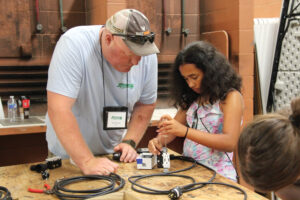
To learn about construction and repair of electric lines, campers put on lineman gear and learn how to use the tools linemen use every day.
“We also demonstrate the latest technology in electric vehicles and teach youth how to program robots to perform specific tasks,” Buschermohle says. “We are always looking to incorporate the latest technology. When we first started camp, robots and drones were futuristic. Today, we are teaching youth at camp how to program robots and fly drones.”
High Voltage, Bright Futures
Each summer, the 4-H Electric Camp welcomes approximately 250 campers who are active 4-H members and have just completed sixth, seventh or eighth grade. Since 1992, more than 9,000 4-H members have attended camp.
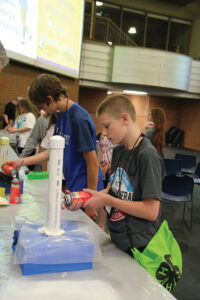
“Electric Camp is a valuable experience because those attending have the chance to meet other 4-H’ers from across the state and explore careers in energy, electricity and basic sciences,” says Steve Sutton, who co-founded the camp as a member of the state 4-H staff. “For some, it’s even their first experience away from home. They are able to not only learn about electricity, but also develop social skills, decisionmaking skills, and experience responsibility and self-reliance. They experience a college campus and are introduced to the field of engineering. We give them many opportunities to interact with each other and make friends for a lifetime.”
Although the majority of the camp is spent learning in STEM subject areas, incorporating fun activities is also an important part of the experience.
“Each year, we spend an afternoon at Dollywood, throw the campus’ largest pizza party, and end the camp with a swimming and dance party,” Buschermohle says.
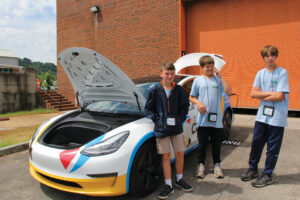
Light it Up at Electric Camp
The 4-H Electric Camp would not be possible without important partnerships between UT Extension and the power industry in Tennessee. That partnership includes the Tennessee Electric Cooperative Association and its statewide member cooperatives, the Tennessee Municipal Electric Power Association and its statewide member municipal systems, TVA, the Tickle College of Engineering, and allied industry donors.
“This partnership provides financial assistance to help offset the cost of the camp, donates equipment and supplies for the learning centers, and supplies volunteers to help plan and teach the hands-on learning centers,” Buschermohle says. “Over the 30 years the camp has been offered, this partnership has contributed over $1 million in financial assistance to make it affordable for youth, over $100,000 in donated supplies for the learning centers and over 50,000 hours of volunteer labor to help teach the learning centers.”
Sutton has noticed many 4-H members attend camp because their parents were previous campers who want their children to have the same experience they did.
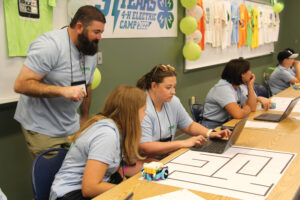
“The experiences help youth develop life skills that will be valuable into adulthood,” Sutton says. Many campers use what they have built or learned at camp to teach other youth through demonstrations and presentations at the county, regional or state level. “We have also had several campers go on to become engineers and scientists,” Buschermohle says. “Many jobs available in the future will revolve around STEM subject areas, and it is critical that 4-H youth gain knowledge and excitement in these areas at an early age. The future of the 4-H Electric Camp is very bright.”
You can help support 4-Hʼers in STEM by giving to Electric Camp or the electric project. Donations may be made by visiting tn4hfoundation.org/donate.